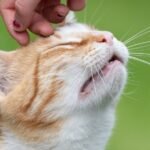Your feline companion might be sending you subtle messages that you’re inadvertently driving them up the wall. As frustrating as your cat’s behavior might be, it may help to know that they are not trying to annoy you. The truth is, many of our well-intentioned actions can create stress, discomfort, or outright irritation for our cats. Understanding these habits isn’t just about preventing behavioral problems. It’s about building a stronger bond with your furry friend and creating a harmonious home environment for everyone.
When it comes to your cat, however, it may be a little easier to avoid annoying them. Just like humans, cats have individual preferences – especially when it comes to touch and sensory experiences. So let’s dive into the most common habits that might be getting under your cat’s fur.
Ignoring Their Litter Box Standards

Think your daily scoop is enough? Your cat might disagree. When kept indoors without enough activities to keep them busy and occupied, they may engage in activities their owners find annoying or problematic. These include jumping onto kitchen counters, destructive behaviors, attention seeking that drives owners crazy, aggressive play, nighttime activities that keep owners awake, or excessive meowing.
One of the biggest culprits behind these behaviors is a subpar litter box situation. If you’ve ruled out medical issues, one common problem is when a cat finds something about their litter box that is not up to their standards. If you want to keep your cat using the litter box regularly, make sure you know some common mistakes that cat parents make with their cat’s litter box. This isn’t about being a clean freak. It’s about respecting your cat’s natural instincts and preferences.
Overdoing the Petting Sessions

That blissful purring can quickly turn into a swat or bite if you miss the warning signs. Sensitivity threshold: The cat enjoys the human contact at first, but then the repetitiveness of the petting becomes irritating. The cat turns and bites as a way to say, “I’ve had enough.” This isn’t your cat being moody or ungrateful for attention.
Cats are sensitive creatures, especially when it comes to being touched. A petting session that runs a minute too long can end with an unexpected nip or swat. Every cat has their own tolerance threshold, and some spots are absolute no-go zones. When petting your cat, stick to safe spots where most cats enjoy being touched: the top of the head, sides of the face, underside of the chin, and no farther down than the back of the neck. Common areas to avoid include the cat’s belly, legs, and paws.
Disturbing Their Sleep for Cuddles

Picture this: you’ve just settled in for a cozy nap when someone decides it’s the perfect time for a chat. Annoying, right? Imagine you’ve just stretched out on your bed for a little snooze, when someone comes along wanting you to entertain them. (If you live with a human child, you probably don’t have to try very hard to imagine this scenario.) You wouldn’t love it – and neither does your cat.
Cats sleep roughly 12-16 hours per day, and this isn’t laziness. Their sleep patterns are deeply ingrained survival mechanisms. Interrupting these rest periods for your need for affection can create genuine stress and irritation. Dr. Turano calls this behavior the second-best way to annoy your cat, after a dirty litter box.
Using Strongly Scented Products

Your cat’s nose is roughly fourteen times more sensitive than yours. Cats are extremely sensitive to scents. Their noses are about 14x stronger than ours. So cats prefer unscented litter. That lavender-scented litter or heavily perfumed air freshener near their food bowl might be overwhelming them in ways you can’t imagine.
Ideally, a litter without a strong scent is best, as cats are very sensitive to odors. Litters scented with perfumes and other strong fragrances are produced more for the benefit of our noses rather than those of our cats. Strong fragrances and/or perfumes associated with the box may be enough to drive your cat away from it. This sensitivity extends beyond the litter box to cleaning products, candles, and even your personal care items.
Placing Their Resources in Poor Locations

Location matters immensely to cats, yet many owners place litter boxes and feeding stations wherever it’s convenient for humans. As convenient as it is for us to put a litter pan in the laundry room, it isn’t so nice for our cats. The sudden changes in sounds that can come from washers and dryers may be frightening, which may make your cat decide that going to the bathroom somewhere else is safer. The same goes for any other noisy place around the house – the garage, near the kids’ playroom, or even the kitchen.
Cats are territorial creatures. They prefer a quiet, low-traffic area to go to the bathroom. Put the litter box in a quiet area so your cat can have a private bathroom. The same principle applies to food and water bowls. Cats need to feel safe and secure when they’re vulnerable, whether eating, drinking, or using the bathroom.
Playing with Laser Pointers Without Payoff

That red dot might seem like harmless fun, but it can actually create frustration for your cat. Avoid shining the light in your cat’s eyes, and always offer a tangible reward after, such as a treat or a toy they can physically catch. Without this, some cats may feel frustrated or anxious. Dr. Foster explains further: “Cats are natural hunters and constantly chasing an invisible target without resolution can leave them amped up, agitated, or even bored.
Think of it like being promised a delicious meal, then having it snatched away just as you’re about to take a bite. If you use a laser pointer, one tip is to end the session with a toy they can actually catch, like a feather wand or soft plush toy. This gives your cat the satisfaction of completing their hunting sequence.
Constant Food and Environmental Changes

Cats are creatures of habit who find comfort in consistency. Most likely, you wouldn’t love eating the same thing for every meal, every day – but Dr. Jennifer Sperry and veterinary advisor at Pets Plus Us, says that your cat probably does. “Many cats prefer routine,” she says, explaining why varying your cat’s diet may annoy them. “Changing their food flavor and texture frequently might not be the culinary adventure you hope it will be.”
The same applies to their environment. Don’t move the box around often. Cats get stressed very easily with changes. Add a second box to a new area that’s more private and quiet. Sudden changes to furniture arrangement, new scents, or different feeding schedules can create anxiety and stress that manifests as behavioral problems you might interpret as your cat being difficult.
Conclusion

Understanding these seven habits is about more than just avoiding scratches or inappropriate elimination. It’s about recognizing that your cat communicates differently than you do and has needs that might not always align with human convenience. Your cat is communicating with you and most likely trying to get your attention because they have a strong bond with you. However, try to figure out if there is an underlying problem, such as a health issue, separation anxiety, or boredom, as these will need to be addressed directly.
The beauty of cats lies partly in their independence and unique personalities. By adjusting these common habits, you’re not just preventing annoyance. You’re creating an environment where your cat feels understood, respected, and truly at home. What changes will you make first to strengthen your bond with your feline friend?






